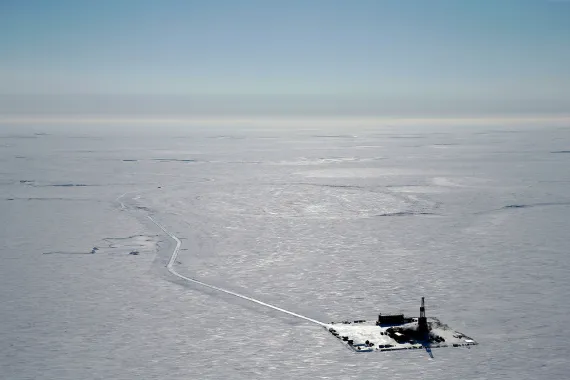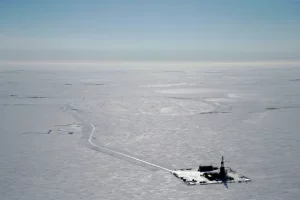The United States has approved a contentious oil-and-gas drilling project in the northwestern state of Alaska, drawing condemnation from environmentalists who say the move flies in the face of President Joe Biden’s climate pledges.
The US Department of the Interior announced on Monday that it had approved a scaled-back version of ConocoPhillips’s $7bn Willow project on Alaska’s petroleum-rich North Slope.
ConocoPhillips had sought to build up to five drill sites, dozens of kilometres of roads, seven bridges and multiple pipelines.
The Interior Department approved the project with three drill pads after saying last month that it was concerned about its greenhouse gas impacts, cutting the size of the company’s proposal by 40 percent by denying two requested drill pads.
That would reduce the project’s freshwater use and prevent the development of 18km (11 miles) of roads, 32km (20 miles) of pipelines, and 54 hectares (133 acres) of gravel, the department said on Monday.
“The actions will create an additional buffer from exploration and development activities near the calving grounds and migratory routes for the Teshekpuk Lake caribou herd, an important subsistence resource for nearby Alaska Native communities,” it said in a statement.
The decision comes despite an aggressive 11th-hour campaign from opponents who say the development of the three drill sites conflicts with Biden’s highly publicised efforts to fight climate change and rapidly shift to cleaner sources of energy.
“The harmful effects of President Biden’s decision cannot be overstated,” Sierra Club Executive Director Ben Jealous said in a statement.
“Willow will be one of the largest oil and gas operations on federal public lands in the country, and the carbon pollution it will spew into the air will have devastating effects for our communities, wildlife, and the climate. We will suffer the consequences of this for decades to come.”
Willow’s fate has been closely watched by Alaska officials, the oil and gas industry, and environmental groups, and the Biden administration’s decision is not likely to be the last word, with litigation expected from environmentalists.
The project, located in the federally designated National Petroleum Reserve-Alaska, enjoys widespread political support in the state.
Alaska Native state lawmakers recently met with Interior Secretary Deb Haaland to urge support for Willow, and the company has said it considers the three-site option approved on Monday workable.
But environmental activists have promoted a #StopWillow campaign on social media, seeking to remind Biden of his pledges to reduce planet-warming greenhouse gas emissions and promote clean energy.
Christy Goldfuss, a former official in President Barack Obama’s White House who now is a policy chief at the Natural Resources Defense Council (NRDC), said she was “deeply disappointed” at Biden’s decision to approve Willow.
The NRDC estimates that the project would generate planet-warming greenhouse gas emissions equivalent to more than one million homes.
“This decision is bad for the climate, bad for the environment and bad for the Native Alaska communities who oppose this and feel their voices were not heard,” Goldfuss said.
Monday’s approval came after the Biden administration on Sunday announced new protections for Alaskan land and water.
It said it would make nearly 1.2 million hectares (3 million acres) of the Beaufort Sea in the Arctic Ocean “indefinitely off limits” for oil and gas leasing, building on an Obama-era ban and effectively closing off US Arctic waters to oil exploration.
It also issued protections for 5.2 million hectares (13 million acres) of “ecologically sensitive” special areas within Alaska’s petroleum reserve.







